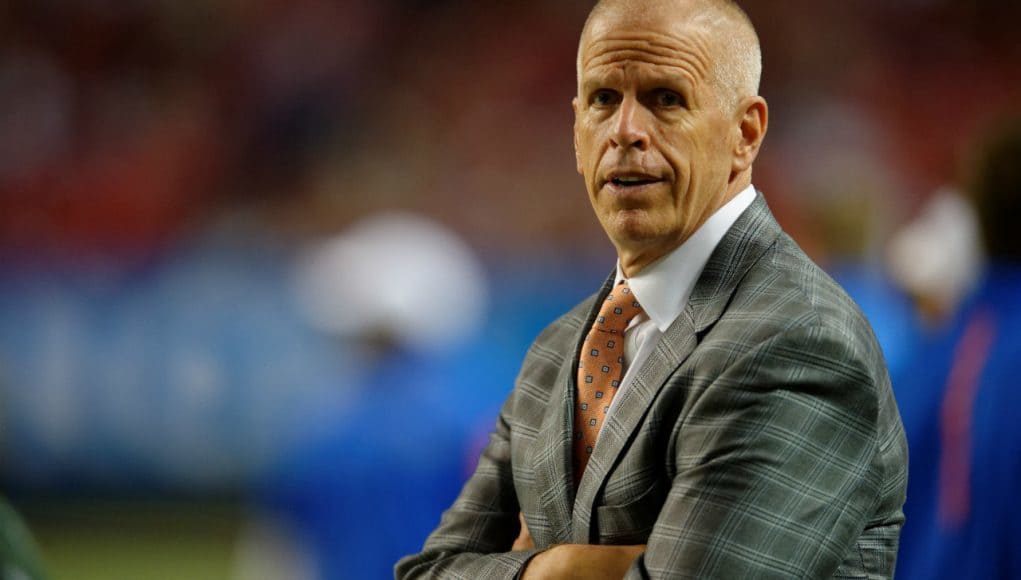DESTIN — Jim Harbaugh has attacked satellite camps with an enthusiasm unknown to mankind. The Wolverines are scheduled to be at 38 camps in 22 states and that doesn’t even include camps in Australia and American Samoa.
The stir set off by Harbaugh’s initial tour in the summer of 2015 sent the SEC into a defensive mode, with commissioner Greg Sankey quickly taking a stance, calling these types of camps “recruiting tours.” The SEC stood against the camps and with good reason. Is it a surprise that the conferences and coaches that have backed satellite camps mostly come from northern schools, while the ACC and SEC, located in the abundantly fertile recruiting grounds of the south.
The SEC stood staunchly against satellite camps, along with the ACC, and banned their coaches from the practice on April 8.The NCAA ruled, briefly, to ban satellite camps, but the ruling was overturned just three weeks later on April 28.
Now, begrudgingly, the SEC is playing ball, ending their self-imposed ban on camps last week.
“We don’t think satellite camps are healthy in college football recruiting. And they are about recruiting,” SEC commissioner Greg Sankey said on Tuesday. “I’m concerned and I think this conference remains concerned about what happens around those camps this summer. But that is the football recruiting culture that’s been adopted now, and we’ll see what happens this summer.”
The battle over whether satellite camps should be allowed has largely been the ACC and SEC vs. the rest of the conferences, but the SEC is less concerned where other conferences are going, they know the schools in their backyard are the ones that they really need to worry about.
“There’s 14 coaches, we’re very competitive,” Arkansas coach Bret Bielema said. “We’re all carnivores, we all look to attack and hunt.”
Bielema doesn’t have a lot of coaches coming into his state, but Jim McElwain sure does at Florida.
“Everybody in the country has recruited the state of Florida well before any of this,” McElwain said. “As long as the rules allow, I mean they should come; it’s as good a football as there is in the country.
“Would I rather they not come? Sure, that’d be a good deal.”
At this time, Gator Country has confirmed 11 camps that Florida will attend. Sites range from Detroit, Michigan to Virginia, four in Georgia, Alabama and, of course, several in Florida.
McElwain hasn’t taken a strong stance for or against the practice; he just wants everyone to be on an equal playing field. Nick Saban, however, does feel strongly. He took out some of his emotion on the subject, smacking the podium he stood behind while addressing satellite camps.
“I don’t know how much it benefits anybody because all the people that say this is creating opportunities for kids, this is all about recruiting,” Saban said. “That’s what it’s about. Anybody that tells you that. What’s amazing to me is somebody didn’t stand up and say here’s going to be the unintended consequences of what you all are doing.”
Florida Athletic Director Jeremy Foley, who had long been strongly against satellite camps, took a softer tone on Wednesday, but still is not endorsing the practice, although he has resigned that the SEC will participate.
“Bottom line is, satellite camps are supposed to be instructional. No question it turned into recruiting camps. So we’ve expanded the recruiting calendar. If that’s what we want to do, then let’s change the rules,” he said. “Let’s put that in the rule book. We’re now going to have recruiting opportunities throughout the whole course of the year. That’s my concern. I think we’re going to introduce third-party people into the equation. We don’t do it in basketball for all those reasons. I just think, like I said, we’ve got to get our arms around it. I’m not saying right or wrong. We’ve expanded the recruiting calendar, and I’m not so sure that was supposed to be the intent.”
The bottom line is that college football coaches by nature are competitive beings. Add in exorbitant contracts and pressure to win at all costs, and these satellite camps can quickly get out of hand. The Big Ten has been the biggest supporter and flag bearer out of necessity. They need to get into the South to recruit. For a long time they didn’t have to contend with the SEC coaches, now that they do we’ll so how quickly things will get out of control.


